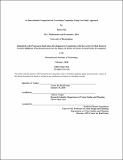| dc.contributor.advisor | Andrea Chegut. | en_US |
| dc.contributor.author | Fan, Tianyi,S.M.Massachusetts Institute of Technology. | en_US |
| dc.contributor.other | Massachusetts Institute of Technology. Center for Real Estate. Program in Real Estate Development. | en_US |
| dc.date.accessioned | 2020-10-18T21:18:27Z | |
| dc.date.available | 2020-10-18T21:18:27Z | |
| dc.date.copyright | 2020 | en_US |
| dc.date.issued | 2020 | en_US |
| dc.identifier.uri | https://hdl.handle.net/1721.1/128047 | |
| dc.description | This electronic version was submitted by the student author. The certified thesis is available in the Institute Archives and Special Collections. | en_US |
| dc.description | Thesis: S.M. in Real Estate Development, Massachusetts Institute of Technology, Program in Real Estate Development in conjunction with the Center for Real Estate, 2020 | en_US |
| dc.description | Cataloged from student-submitted PDF of thesis. | en_US |
| dc.description | Includes bibliographical references (pages 84-86). | en_US |
| dc.description.abstract | Coworking industry has achieved rapid development during recent years. People increasingly realize that coworking is far beyond a revolutionary office model which changes traditional office structure into a more flexible and creative working environment. The Coworking industry now plays a transformative role in real estate industry and technology development. It is also viewed as an important motivating factor for entrepreneurship. The "coworking" concept has deep impact on the "work-live-play" lifestyle for professionals. WeWork and International Workplace Group (IWG) are two world's leading coworking giants which have significant market and geographical presence in all main markets. However, these two multinational coworking companies are not monopoly in the market. A growing number of local coworking companies have become strong competitors. | en_US |
| dc.description.abstract | Although the recent decade has witnessed robust growth of coworking industry, systematic comparison study on coworking companies is still limited in both the academia and the industry. My thesis makes an early attempt to conduct an international comparison on some coworking companies in three main markets: U.S, China and Europe from three dimensions: expansion strategy, financing, and supporting role to entrepreneurs and enterprise clients. The first section of is to examine WeWork and IWG's development and operation across those three main markets. For the second section, I select one leading coworking company in each market to critically evaluate their market practice and business strategy using case study approach. After that, a discussion on key differences among these three coworking firms is performed. | en_US |
| dc.description.abstract | Additionally, I propose some possible explanations for their variations in three comparison metrics across different companies and markets considering market factors, organizational value, geographical features and government policies. Two strategic decisions for the coworking industry are discussed: 1) whether coworking compang should lease the space or partner with landlords and then provide coworking services? 2) entrepreneurs or corporate clients, which customer segment should be the business focus of cowering industry? The financial crisis experienced by WeWork in late 2019 re-emphasizes the importance of these two decisions. This thesis contributes to international comparative study on coworking firms and provides some implications for the future sustainable development of this industry. | en_US |
| dc.description.statementofresponsibility | by Tianyi Fan. | en_US |
| dc.format.extent | 86 pages | en_US |
| dc.language.iso | eng | en_US |
| dc.publisher | Massachusetts Institute of Technology | en_US |
| dc.rights | MIT theses may be protected by copyright. Please reuse MIT thesis content according to the MIT Libraries Permissions Policy, which is available through the URL provided. | en_US |
| dc.rights.uri | http://dspace.mit.edu/handle/1721.1/7582 | en_US |
| dc.subject | Center for Real Estate. Program in Real Estate Development. | en_US |
| dc.title | An international comparison on coworking companies using case study approach | en_US |
| dc.type | Thesis | en_US |
| dc.description.degree | S.M. in Real Estate Development | en_US |
| dc.contributor.department | Massachusetts Institute of Technology. Center for Real Estate | en_US |
| dc.identifier.oclc | 1200210958 | en_US |
| dc.description.collection | S.M.inRealEstateDevelopment Massachusetts Institute of Technology, Program in Real Estate Development in conjunction with the Center for Real Estate | en_US |
| dspace.imported | 2020-10-18T21:18:23Z | en_US |
| mit.thesis.degree | Master | en_US |
| mit.thesis.department | RED | en_US |
